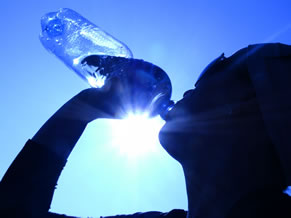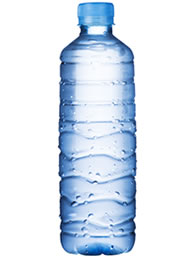Revive. Refresh. Drink More Water!

Ever notice how lifeless a house plant looks when you forget to water it? Just a little water and it seems to perk back up. Water is just as essential for our bodies because it is in every cell, tissue, and organ in your body. That's why getting enough water every day is important for your health.
Healthy people meet their fluid needs by drinking when thirsty and drinking fluids with meals. But, if you're outside in hot weather for most of the day or doing vigorous physical activity, you'll need to make an effort to drink more fluids.
Most of your water needs are met through the water and beverages you drink. You can get some fluid through the foods you eat. For example, broth soups and other foods that are 85% to 95% water such as celery, tomatoes, oranges, and melons.
Water helps your body with the following:
- Keeps its temperature normal.
- Lubricates and cushions your joints.
- Protects your spinal cord and other sensitive tissues.
- Gets rid of wastes through urination, perspiration, and bowel movements.
You need water to replace what your body loses through normal everyday functions. Of course, you lose water when you go to the bathroom or sweat, but you even lose small amounts of water when you exhale. You need to replace this lost water to prevent dehydration.
Your body also needs more water when you are:
- In hot climates.
- More physically active.
- Running a fever.
- Having diarrhea or vomiting.
To help you stay hydrated during prolonged physical activity or when it is hot outside, the Dietary Guidelines for Americans 2005 recommend these two steps:
- Drink fluid while doing the activity.
- Drink several glasses of water or other fluid after the physical activity is completed.1
Also, when you are participating in vigorous physical activity, it's important to drink before you even feel thirsty. Thirst is a signal that your body is on the way to dehydration. For more information, visit Fit Facts, Healthy Hydration from the American Council on Fitness.* (PDF-1.4Mb)
Some people may have fluid restrictions because of a health problem, such as kidney disease. If your healthcare provider has told you to restrict your fluid intake, be sure to follow that advice.
Under normal conditions, most people can drink enough fluids to meet their water needs. If you are outside in hot weather for most of the day or doing vigorous activity, you may need to increase your fluid intake.
 If you think you're not getting enough water each day, the following tips may help:
|
Sorry but no. In fact, they can hurt, and actually increase your need for more water to eliminate the extra burden sugar-sweetened drinks place on your body. Although beverages that are sweetened with sugars do provide water, they usually have more calories and non-nutritive ingredients than unsweetened beverages. To help with weight control, you should consume beverages and foods that do not have added sugars.
Examples of beverages with added sugars or sweeteners:
- Most fruit drinks.
- Most sports drinks.
- Most soft drinks and sodas.
Visit Rethink Your Drink from the Centers for Disease Control and Prevention (CDC), for more information about the calories in beverages and how you can make better drink choices to maximize the benefits of water, and minimize the effects of empty calories.

- HHS & USDA. Dietary Guidelines for Americans, 2005. Chapter 2: Adequate Nutrients Within Calorie Needs. Updated July 9, 2008.
- Centers for Disease Control and Prevention, Nutrition for Everyone, Water: Meeting Your Daily Fluid Needs, October 5, 2016.
- U.S. National Library of Medicine & NIH. MedlinePlus Medical Encyclopedia: Water in Diet, December 21, 2017.